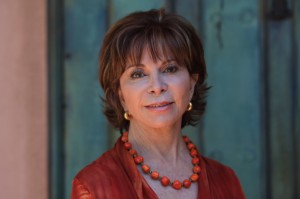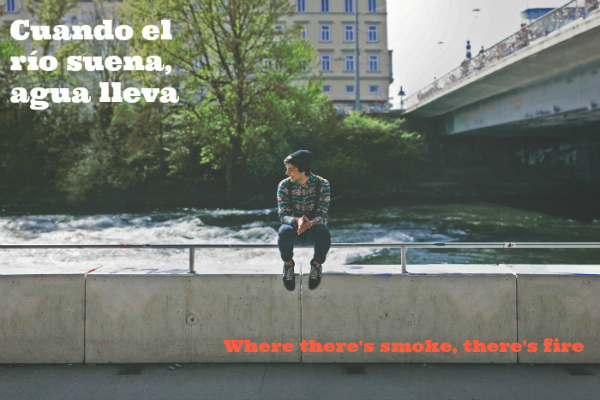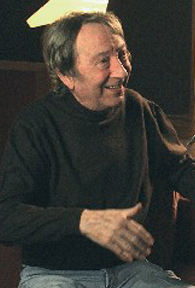Dichos españoles y sus equivalentes en inglés / Spanish idioms and their English equivalents
Como todos los idiomas, el español acumula muchas frases hechas y refranes que sirven de reflejo de las ideas y la filosofía popular de los españoles. El refranero español es uno de los más completos que se conocen en el mundo, con casi 100.000 refranes registrados. Pero además las frases hechas y los refranes son un recurso muy útil para los estudiantes de español ya que el uso de refranes es una parte consustancial de la forma de hablar habitual de los hispanohablantes.
Para abrir boca aquí os presentamos algunos de los refranes españoles más utilizados, su traducción literal y su equivalente en inglés:
Like every language does, Spanish accumulates many idioms that reflect the Spanish popular way of thinking. “El refranero español” (The Spanish book of proverbs) is one of the most complete in the world, with nearly 100,000 registered idioms and proverbs. But also, they are very useful for students of Spanish because they are an essential part of the popular and informal way of speaking.
Here you have a short list with some of the most used and useful Spanish proverbs and idioms, their literal translations and their equivalent in English:
Del dicho al hecho hay un trecho.
Literal translation: From the spoken words to the facts there is a long way.
English equivalent: Easier said than done a stretch.
A buen entendedor, pocas palabras bastan.
Literal translation: To the good listener, few words are enough.
English equivalent: A word is enough to the wise.
Más vale pájaro en mano que ciento volando.
Literal translation: A bird in the hand is worth hundred flying.
English equivalent: A bird in the hand is worth two in the bush.
Cuando hay hambre, no hay pan duro.
Literal translation: When you are hungry, there is no hard bread.
English equivalent: Beggars can’t be choosers.
Dios los cría y ellos se juntan.
Literal translation: God raises them and they get together.
English equivalent: Birds of a feather flock together.
No vendas la piel del oso antes de cazarlo.
Literal translation: Don’t sell the bear’s skin before you get to hunt it.
English equivalent: Don’t count your chickens before they are hatched.
No te lo juegues todo a una sola carta.
Literal translation: Don’t bet all to one card.
English translation: Don’t put all your eggs in one basket.
Hecha la ley, hecha la trampa.
Literal translation: Done the law, done the trick.
English equivalent: Every law has its loophole.
Por un perro que maté, mataperros me llamaron
Literal translation: I killed a dog and now they call me dog killer.
English equivalent: Give a dog a bad name and hang it.
Dios aprieta pero no ahoga.
Literal translation: God squeezes but does not choke.
English equivalent: God tempers the wind to the shorn lamb.
Vísteme despacio que tengo prisa.
Literal translation: Dress me slowly that I’m in a hurry.
English equivalent: More haste, less speed.
Lo cortés no quita lo valiente.
Literal translation: Politeness doesn’t override bravery.
English equivalent: Politeness costs nothing.
En casa del herrero, cuchillo de palo.
Literal translation: In the Blacksmith’s home they use a wooden knife.
English equivalent: The shoemaker’s son always goes barefoot.
Cuando el río suena, agua lleva.
Literal translation: When you hear the river it’s because it carries water.
English equivalent: Where there’s smoke, there’s fire.
Debido a su gran importancia, pero también porque se trata de una parte del español que combina cultura y lengua de forma tan interesante como entretenida, el Instituto Cervantes de Nueva York ofrece a partir del 21 de junio un curso especializado para que los estudiantes se familiaricen con algunos de los refranes más comunes del español y sepan identificar las mejores ocasiones para utilizarlos.
Because of its great importance, but also because it is a part of the Spanish culture that combines entertainment and language, Instituto Cervantes New York offers a specialized course to familiarize students with some of the most commonly used Spanish idioms and proverbs.
Día del Libro – Lectura de Don Quijote / World Book Day – Readings of Don Quixote
Con motivo de la celebración del 23 de abril, Día del Libro, el Instituto Cervantes de Nueva York en colaboración con UNIS (United Nation International School) organizó una lectura parcial bilingüe de El Quijote.
Asimismo, niños de varias nacionalidades leyeron en su lengua materna la primera frase de este clásico imperecedero, y así, pudimos escuchar el célebre En un lugar de la mancha de cuyo nombre no quiero acordarme… en 12 lenguas: chino, danés, español, francés, hebreo, holandés, italiano, japonés, portugués, ruso, sueco y turcomano.
Paola Martínez, profesora del ICNY realizó para los asistentes una introducción en la lectura y en nuestro insigne personaje, para a continuación comenzar la lectura en español y en inglés en la que participaron alumnos y profesores.
Abrió la lectura en español Ignacio Olmos, director del ICNY y en inglés Stefania Scotti, jefa del departamento de Lenguas Extranjeras en UNIS.
Sin duda, fue una jornada especial para niños y mayores en la que compartimos y celebramos nuestro amor por los libros y la lectura.
Al finalizar el acto, y gracias a la Asesoría de Educación del Consulado de España NY, todos los participantes, recibieron un ejemplar de la adaptación de El Quijote de Rosa Navarro Durán, de edebé, edición de 2011.
A continuación os mostramos unas fotografías de la actividad
Y vosotros, ¿Cómo celebrastéis el Día del Libro?
Fotos: Día del libro
In honor of World Book Day celebrated on April 23rd, Instituto Cervantes New York in collaboration with UNIS organized a bilingual reading from the most memorable chapters of Don Quixote.
Children from a host of nationalities red in their mother tongues, the first phrase from this most famous of works. Somewhere in la Mancha, in a place whose name I do not care to remember… was read in Chinese, Italian, French, Danish, and many other languages. Prior to the reading, Paola, one of our talented teachers, gave a dynamic and animated lesson about the main characters from Don Quixote. Following this engaging introduction the English and Spanish readings were completed by the UNIS students and their professors.
It was, without a doubt, and incredible special day for all involved and a great way to share our love of literature. Through these pictures we share the event with you.
How did you celebrate World Book Day?
Photos: Día del libro
Isabel Allende presentará su último libro “El juego de Ripper” en el Instituto Cervantes de Nueva York / Isabel Allende will present “Ripper” at Instituto Cervantes in New York
 “Mis logros más significativos no son mis libros, sino el amor que comparto con unas pocas personas, especialmente mi familia, y las formas en que he tratado de ayudar a los demás”. A pesar de estas palabras de Isabel Allende, la carrera literaria de la escritora chilena está llena de éxitos: su primera novela “La casa de los espíritus”, publicada en 1982, se convirtió en uno de los títulos míticos de la literatura latinoamericana. Isabel Allende cuenta con más de 60 millones de libros vendidos y 50 premios internacionales. Sus novelas han sido traducidas a más de 35 idiomas. El próximo 17 de abril a las 19:00h Isabel Allende presentará “El juego de Ripper” en el Instituto Cervantes. Aquí puedes ver el resumen de la novela. http://youtu.be/F86vM4vLVyY Puede adquirir las entradas por teléfono (212-308-7720), presencialmente en el ICNY (hasta las 6:30PM del mismo día de la actividad) o a través de internet Entrada general: 20 $ – Entrada socios del Instituto Cervantes: 10 $
“Mis logros más significativos no son mis libros, sino el amor que comparto con unas pocas personas, especialmente mi familia, y las formas en que he tratado de ayudar a los demás”. A pesar de estas palabras de Isabel Allende, la carrera literaria de la escritora chilena está llena de éxitos: su primera novela “La casa de los espíritus”, publicada en 1982, se convirtió en uno de los títulos míticos de la literatura latinoamericana. Isabel Allende cuenta con más de 60 millones de libros vendidos y 50 premios internacionales. Sus novelas han sido traducidas a más de 35 idiomas. El próximo 17 de abril a las 19:00h Isabel Allende presentará “El juego de Ripper” en el Instituto Cervantes. Aquí puedes ver el resumen de la novela. http://youtu.be/F86vM4vLVyY Puede adquirir las entradas por teléfono (212-308-7720), presencialmente en el ICNY (hasta las 6:30PM del mismo día de la actividad) o a través de internet Entrada general: 20 $ – Entrada socios del Instituto Cervantes: 10 $
“My most significant achievements are not my books, but the love I share with a few people—especially my family—and the ways in which I have tried to help others”. These words notwithstanding, the life of Chilean writer Isabel Allende is full of professional achievements. Her first novel published in 1982, “The house of the spirits”, has became a bestseller and one of the most famous titles of the Latin-American literature. Isabel Allende has sold more than 60 million books and won more than 50 international awards. Her novels have been translated to more than 35 languages. On April 17th at 7pm Isabel Allende will present her newest work, “Ripper”, at Instituto Cervantes New York. General Admission: $ 20 | ICNY Members: $10 (Membership has its benefits!) You may purchase the tickets over the phone (212-308-7720), at ICNY (before 6:30PM the day of the event) or online. Check out a presentation of the novel from the author herself. http://youtu.be/F86vM4vLVyY
Viaja a España a través de nuestra gastronomía / Travel to Spain through our cuisine

La gastronomía española deleita los paladares más exquisitos. ¿Te gusta la gastronomía y la cultura española? Estos serán los ingredientes protagonistas de nuestro “Tapas Workshop” y de “Desserts Workshop”.
En el Instituto Cervantes de Nueva York, trasladaremos la cultura de la tapa al centro de Manhattan para que puedas aprender las tapas más características de las diferentes ciudades españolas.
Además también trasladaremos tres postres típicos del Norte de España: peras al vino, tejas de Tolosa y leche frita de Pamplona. Tres platos que te ayudarán a incrementar tu lista de postres y que puedas decir “Yo llevo el postre” cuando te inviten a una cena.
Consulta las fechas y apúntate aquí, por teléfono (212-308-7720) o en persona en nuestro centro (211 E. 49th Street bet. 2nd & 3rd).
Spanish cuisine delights even the most discerning palate. Do you like cuisine and Spanish culture? These are the ingredients of our Tapas Workshop and Desserts Workshop.
At Instituto Cervantes of New York, we bring the tapas culture to the center of Manhattan so you can learn about the most iconic tapas from different Spanish cities.
Moreover, we will also teach you about 3 traditional desserts from the north of Spain: Pears and wine, tejas de Tolosa and Pamplona fried cheese. With these three dishes in your repertoire, the next time you’re invited to dinner you can proudly say, “I’ll bring the dessert”.
Check out the schedule and sign up here, by phone (212-308-7720) or in person (211 E. 49th Street bet. 2nd & 3rd).
El Instituto Cervantes de Nueva York rinde homenaje a Elías Querejeta / Instituto Cervantes New York pays tribute to Elías Querejeta
Desde el pasado 15 de enero hasta el próximo 26 de febrero en el Instituto Cervantes de Nueva York rendimos homenaje al director, productor, guionista y documentalista Elías Querejeta.
Sin duda, Elías Querejeta es el productor más importante de España y uno de los productores más prestigiosos de Europa. Su productora impulsó las grandes obras de Saura, Gutiérrez Aragón, Víctor Erice, Fernando León y su hija Gracia Querejeta.
En el Instituto Cervantes de Nueva York, proyectaremos las obras La Caza”; “El espíritu de la colmena”; “Cría cuervos”; “El desencanto; “La espalda del mundo”; y “Héctor”.
Son películas que como toda su obra tienen selladas su filosofía:
Mi forma de trabajar es implicarme desde el principio en la película. Del guión al montaje’ No sé si es bueno o malo, pero es mi forma de hacer. Por eso yo veo el resultado final antes de los estrenos, porque he vivido todo el proceso con intensidad desde el inicio. Yo trabajo sobre ideas que van surgiendo de conversaciones, de pequeños textos, nunca con un guión que ya me venga dado. Eso me permite más implicación.
Si quieres rendirle homenaje con nosotros, te esperamos en el Instituto Cervantes de Nueva York. Puedes consultar los horarios en nuestra página web o a través de nuestras redes sociales.
¡Te esperamos!
From January 15th to February 26th Instituto Cervantes New York pays tribute to the director, producer, screenwriter and documentarian Elías Querejeta.
Elías Querejeta is one of Spain’s most important film producers and one of the more prestigious producers in Europe. His productions launched the works of Saura, Gutiérrez Aragón, Víctor Erice, Fernando León and his daughter Gracia Querejeta.
Here at Instituto Cervantes we will be screening La Caza; El espíritu de la colmena; Cría cuervos; El desencanto; La espalda del mundo; and Héctor.
Movies, that like all his works, are marked with his philosophy:
My work process is to be involved from the beginning to the end. From the script to the editing. I don’t know if this is good or bad, but that is my way of doing things. That is why I see the final result before the premiere, because I have lived the whole process with intensity since the beginning. I work in ideas that come out of conversations, small texts, but never from a script that is already handed to me. This allows for deeper involvement.
If you would like to join us in paying tribute to him, we are looking forward to seeing you at Instituto Cervantes New York. You can visit the schedules on our web page or social media profiles.
Join us!

